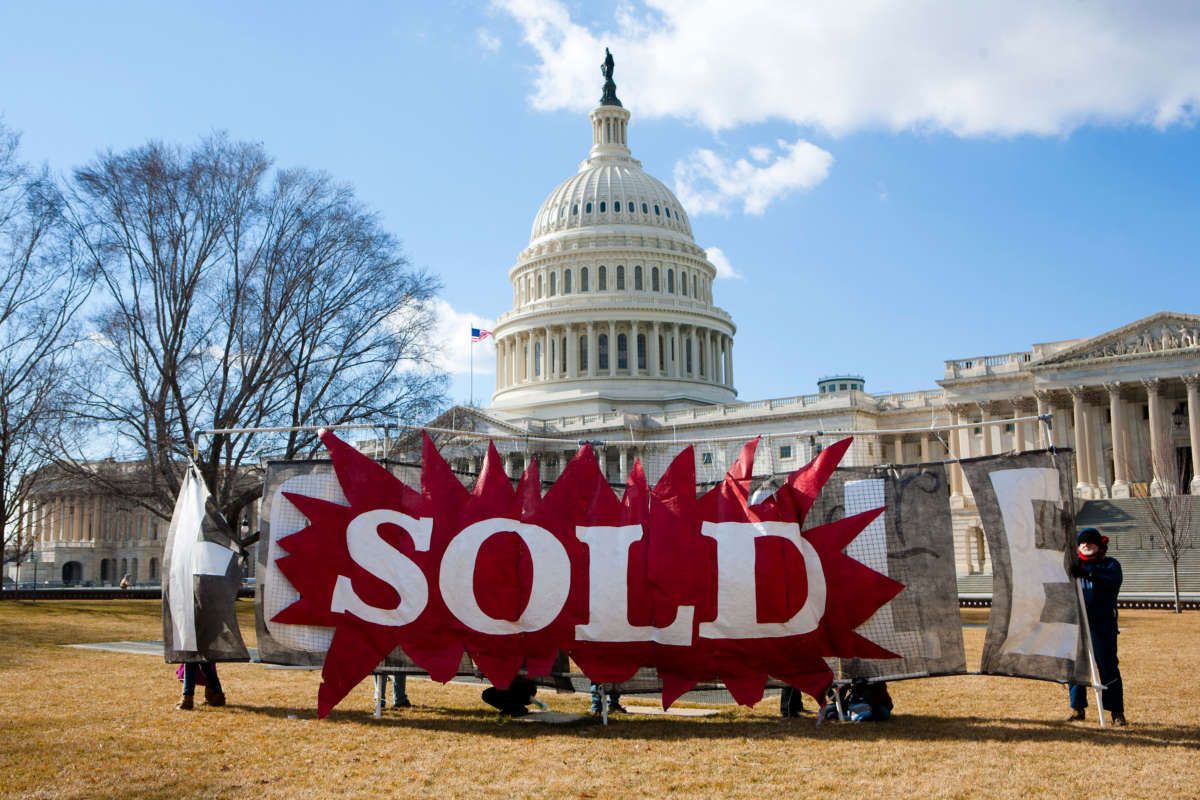Four years ago this week, the Supreme Court ruled in Citizens United vs. Federal Election Commission that the First Amendment prevents the government from restricting independent campaign spending by corporations. The ruling unleashed a deluge of campaign spending that made 2012 by far the most expensive election cycle in history, with nearly $1.3 billion spent independently from candidates’ official campaigns.
We’ve all heard about the super-PACs and dark money nonprofit groups that have funneled millions from corporate and mega-rich donors into presidential and Congressional races, but now new research shows that outside spending has had a big impact on judicial races as well, raising concerns about state judges’ ability to remain impartial in a political world where hefty chunks of campaign cash can make or break elections.
Thirty-eight states hold elections for seats on their supreme courts, including both direct elections and up-or-down votes to retain judges initially appointed by governors or other state officials. In the post-Citizens United election season of 2012, many state judicial races looked a lot like the brutal campaigns waged for Congressional and presidential candidates, with super-PACs paying for vicious attack ads and special interests raising millions of dollars of campaign funds.
Writing in dissent of the Citizens United ruling, former Supreme Court Justice John Paul Stevens warned against the influence that outside spending could have on judicial campaigns. “At a time when concerns about the conduct of judicial elections have reached a fever pitch,” Stevens wrote, “the Court today unleashes the floodgates of corporate and union general treasury spending in these races.”
Expensive efforts by special interest and business groups to campaign for friendly judges or win favors from prospective candidates with independent expenditures are nothing new. In 2006, pro-business groups were responsible for 90 percent of the television advertising in state judicial races, according to the American Constitution Society.
Television spending has only increased since the Citizens United ruling. Nationwide, the 2011 to 2012 cycle saw a record $33.7 million of spending on television ad spending on races for seats on state supreme courts, up from $26 million in the 2007 to 2008 cycle, according to the Brennan Center for Justice. Spending by independent special interest groups on television ads for or against high-court candidates accounted for 27 percent of total spending in these races, with business groups supporting many of these expenditures. In the 2004 election cycle, these groups accounted for only 16 percent of total spending.
More than 90 percent of judicial business in the United States is decided in state courts, and with business interests tangled up in much of the litigation, it’s easy to understand why business groups are spending big on state judicial campaigns. Watchdog groups estimate that the pro-business US Chamber of Commerce spent $100 million between 2000 and 2003 on judicial campaigns, and from 2000 to 2004, 36 of the 40 justices the chamber supported were elected.
The campaign cash seems to be having an impact in the courtroom. Analysis by the American Constitution Society shows that the more money a state supreme court justice receives from business interests, the more likely they are to rule in favor of business litigants who show up in their courtroom. Further statistical analysis reveals that a justice who receives half of his or her contributions from business interests would be expected to rule in favor of business interests about two-thirds of the time.
Researchers also found that Democratic justices are more likely to be influenced by campaign contributions from pro-business groups than Republican justices, presumably because Republican justices are already ideologically predisposed to ruling in favor of business interests.
Such contributions are increasingly important to judges in a world where independent spenders toss millions of dollars into state judicial races, turning judicial elections into high stakes political theater. Unfortunately for voters, weak state laws often help keep special interests paying for television ads hidden from view. In Michigan, for example, the costs of the 2012 Supreme Court election were the highest in the country for the second election cycle in a row, but 75 percent of that spending – much of it on television ads – was not reported to state officials because of weak disclosure laws, according to the Michigan Campaign Finance Network.
Since 2010, 16 states and hundreds of local municipalities have called for a constitutional amendment to overturn the Supreme Court’s Citizens United decision.
Our most important fundraising appeal of the year
December is the most critical time of year for Truthout, because our nonprofit news is funded almost entirely by individual donations from readers like you. So before you navigate away, we ask that you take just a second to support Truthout with a tax-deductible donation.
This year is a little different. We are up against a far-reaching, wide-scale attack on press freedom coming from the Trump administration. 2025 was a year of frightening censorship, news industry corporate consolidation, and worsening financial conditions for progressive nonprofits across the board.
We can only resist Trump’s agenda by cultivating a strong base of support. The right-wing mediasphere is funded comfortably by billionaire owners and venture capitalist philanthropists. At Truthout, we have you.
We’ve set an ambitious target for our year-end campaign — a goal of $250,000 to keep up our fight against authoritarianism in 2026. Please take a meaningful action in this fight: make a one-time or monthly donation to Truthout before December 31. If you have the means, please dig deep.
